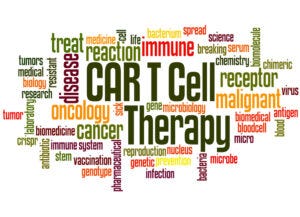September 9, 2022

Shanghai, China-based Neukio Biotherapeutics has completed a $50 million Series A-1 funding to support development of its cell therapy molecules, especially off-the-shelf allogenic CAR-T therapies.
After raising $40 million in an Angel round last year, the company will use these latest funds to accelerate preclinical/clinical validation of induced pluripotent stem cell (iPSC)-derived off-the-shelf CAR-NK cell therapy products, while also expanding its team and operations.
This latest funding was led by CD Capital, with participation from Alwin Capital and Surplus Capital as new investors. Existing shareholders Lilly Asia Ventures, Sherpa Healthcare Partners and IDG Capital also joined.

Image: DepositPhotos/
kataklinger
G&G Capital served as the exclusive financial adviser.
Neukio plans to build on its experience in R&D, CMC and commercialization of autologous CAR-T cell therapies. The company expects to concentrate on iPSC-CAR-NK products, planning to launch allogenic off-the-shelf cell therapy products that can be produced at scale for solid tumors.
Neukio will use inhouse R&D innovation and global collaboration with leading partners to reach its goals. It has already formed a collaboration with Beijing’s gene editing company EdiGene. Now one year old, the company is pleased with its progress to date, citing progress in talent recruitment, facility construction, R&D pipeline and quality management. Neukio is located in Simbay Park in the Shanghai Pilot Free Trade Zone.
Richard Liqun Wang, founder, chairman and CEO of Neukio and former founding CEO of Fosun Kite Biotechnology, brought China’s first CAR-T cell therapy, Yescarca (Axicabtagene Ciloleucel) to the market in less than four years. To address the challenges in manufacturing, clinical application, and patient access of autologous cell therapies, Wang and the Neukio team intend to exploit the clonality and unlimited replication capability of iPSCs while working with cutting-edge gene editing technologies.
Wang said: “In as little as 10 months since the operation of our new laboratories, not only have we completed several signaling pathway modifications and CAR designs tailored for solid tumors, but also we have made significant progress in the development of innovative manufacturing processes of NK differentiation and expansion.
“In today’s challenging environment of capital market, we are honored to have received recognition from [our investors]. The field of cell therapy is rapidly advancing with a promising future and a huge market potential, and iPSC-CAR-NK therapy has the potential to become one of the brightest stars of next generation cell therapy.”
According to Neukio, one of the major contributions of synthetic biology is the invention of chimeric antigen receptors, which are generated by genetic engineering techniques and composed of an antigen-recognizing single-stranded antibody fragments (scFv), a hinge region, a co-stimulatory domain (CD28, 4-1BB), and an activating domain (CD3ζ).
CAR-NK cells can be generated by introducing gene fragments encoding CAR molecules into NK cells or NK precursor cells (such as iPSCs/induced pluripotent stem cells) followed by differentiation and expansion of the edited precursor cells. CAR-T cells have been successfully used in clinical treatment of hematological tumors, where they improve treatment outcomes and survival rates in patients. Several CAR-T products have been approved for clinical use.
Natural killer (NK) cells are key players in the immune system. Derived from bone marrow lymphoid stem cells, NK cells are mainly distributed in bone marrow, peripheral blood, liver, spleen, lung, and lymph nodes. Unlike T- and B-lymphocytes, NK cells can recognize and kill a broad spectrum of non-self cells, including tumor cells and virally infected cells, without the need for pre-immune activation or sensitization.
This is a version of an article first published in ChinaBioToday on September 2, 2022
About the Author
You May Also Like




